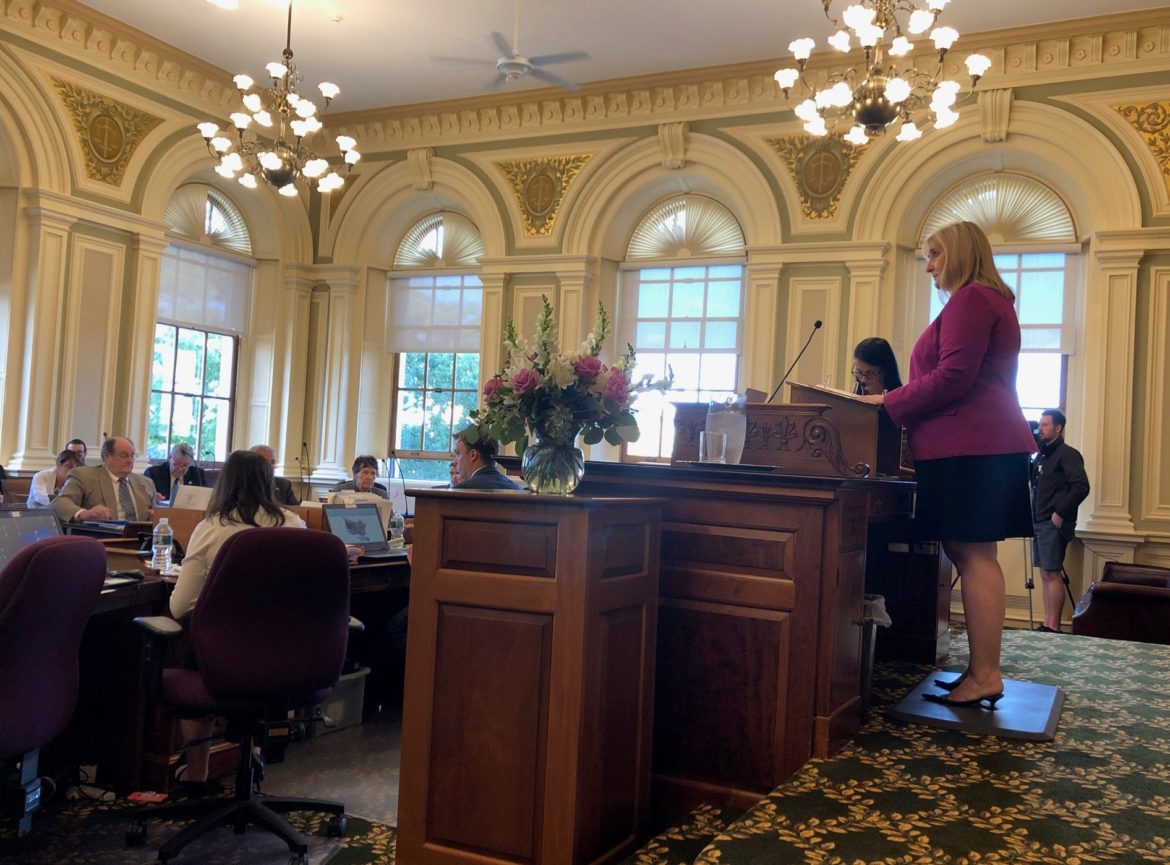By PAULA TRACY, InDepthNH.org
CONCORD – New Hampshire has a state budget for the next two years that works for everyone, most Democrats and Republicans agreed on Wednesday.
The Republican governor and Democratically controlled House and Senate agreed to a compromise budget three months after Chris Sununu vetoed a $13.1 billion plan.
Instead, this $12.9 billion deal will include things that both sides wanted.
It will help property taxpayers and towns with more local tax and school relief. About $40 million will be going to cities and towns to relieve property tax burdens while another $138 million will go to help increase the funding for public education.
For providers of Medicaid services, their rates will go up, but the increase will not go into effect until Jan. 1, delaying that increase.
The deal also retains the business profits tax rate that the governor wanted, but allows for rates to be increased if targeted revenue is not attained, said Michael Kane of the legislative budget assistant’s office.
Kane briefed Senators and House members on the differences between the vetoed bill and the one in front of them for action. A few lawmakers complained they had the compromise budget for less than 24 hours and their constituents hadn’t seen it at all.
There is more money for mental health care, substance use disorder treatment, child protective services, Kane noted.
Senate President Donna Soucy, D-Manchester, told InDepthNH.org that this is a true win for the state’s citizens.
The House voted 327-29 on House Bill 3, the budget bill. The vote on the trailer bill, House Bill 4, was 316-40 in the House, which sent the deal over to the Senate.
In the Senate, things went quickly.
On a voice vote, the Senate voted unanimously to pass the budget bill and 23-1 on the trailer bill with Sen. Bob Giuda, R-Warren, dissenting because the bill increases $3 million to support family planning programs in the state, which Giuda contended supports the infrastructure of health centers that provide abortion.
While the bill does not include any state funds for abortion services, opponents maintain that support for other family planning service supports the bricks and mortar of the clinics.
State Sen. Dan Feltes D-Concord, said the compromise reached was a “Bradley Special,” referring to Republican Sen. Jeb Bradley of Wolfeboro and his ability to find compromise between the governor and elected Democrats.
“Overall we want to thank the governor,” said Feltes, who is a candidate for governor. He said the budget was “a reasonable compromise.”
Bradley said that during his years of serving both in Concord and Washington, the focus has been on “the glass being half empty.”
“What this represents today for all of us is quite a bit more than half full,” Bradley said.
He listed among the winners property taxpayers and businesses…”but we also have enhancements to Medicaid. I could go on and on and on but ….it protects the growing economy in New Hampshire as much as we possibly can.”
He spoke to InDepthNH.org after the vote and was photobombed at the end of the video by Sen. Feltes.
Wanda Duryea, co-founder of the Advocates of Ethical Mental Health Treatment, was not happy that $27 million proposed by Governor Sununu for a new secure psychiatric and countered by the Democratic Legislature with passage of $17 million was cut again.
“Now they renegotiated the budget allowing $8.7 million for a forensic unit because certainly this amount will not allow for an adequate forensic hospital,” Duryea said.
Sen. Chuck Morse, a Republican, thanked Manchester Democratic Sen. Lou D’Allesandro, Senate Finance Chair, for his hard work on hammering out a budget deal with the governor and Democratic leaders in the House.
D’Allesandro told senators “you should feel good about yourselves for helping make life better for New Hampshire residents.”
“Nothing is perfect. Nothing in this life is perfect,” D’Allesandro said, but we are “striving to make things better” for state residents.
Sununu said: “This is a big win for New Hampshire families as we have held the line on taxes, returned cash to cities and towns, and provided historic investments into our education system.”
The new budget also maintains education funding at the levels under the vetoed bill including 100 percent stabilization grants for cities and towns. It converts additional aid for free and reduced lunch programs.
Berlin Mayor Paul Grenier, whose cash-strapped city has been particularly impacted by the state budget impasse and was dealing with reduced funding over the past few years for its streets and schools, thanked the governor.
He said he read the education aid component of the bill “and I am very relieved. Gov. Sununu kept his promise to me that issues relating to stabilization funding would be addressed and I called to thank him. I am very humbled by the work the Democratic legislature did on our behalf.”
The new budget maintains the Business Profits Tax (BPT) and the Business Enterprise Tax (BET) rates at 7.7 percent and 0.6 percent respectively for the BET. Rates can trigger up to 7.9 percent and 0.67 percent respectively for BET on Jan. 1 if the revenues for FY20 are below the plan by 6 percent.
The new budget also squirrels away about $6 million for state employee pay raises if they can come to an agreement on a labor agreement, but currently, there is no deal.
The Secretary of State’s office was expediting its review of the budget and trailer bills and hoped to have the governor sign the bill either Wednesday afternoon on Thursday.
House Republican Leader Dick Hinch, R-Merrimack, issued a statement following the votes.
“The majority of House Republicans supported this legislation today because we believe it is important for our state to move forward with a spending plan that does not raise business taxes, and provides beneficial increases in municipal and education aid,” Hinch said.
Here is the document the Legislative Budget Assistant
released. http://www.gencourt.state.nh.us/LBA/Budget/operating_budgets/2020_2021/HB%203%20and%204/Final%20HB%203%20and%204%20Briefing%209-25-19.pdf





